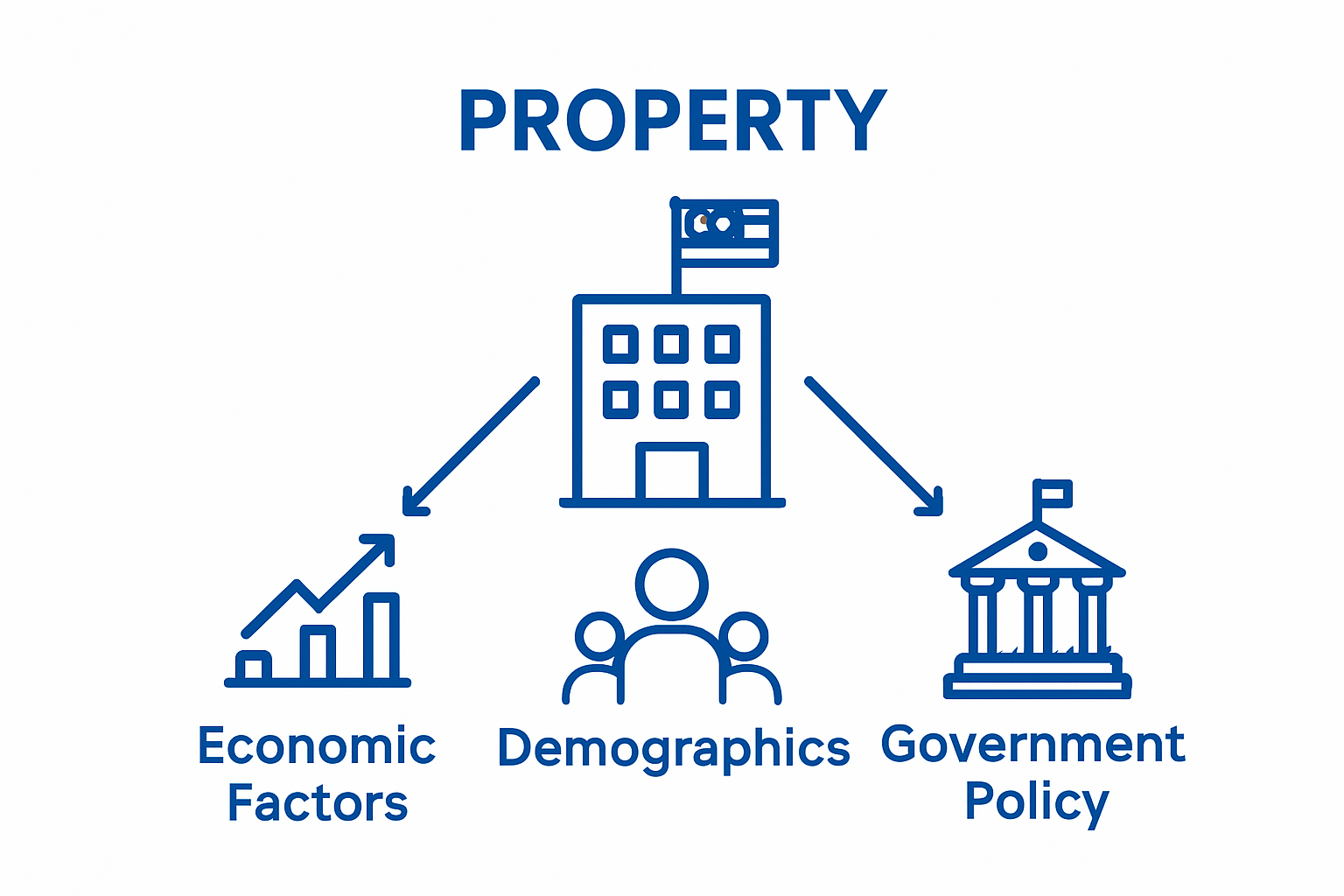
Blog
Understanding Property Market Trend Malaysia 2025 | RumahHQ

Property values across Malaysia have started drawing attention for more than just city skyscraper price tags. Imagine this, experts forecast Malaysia’s economic growth to hit 4.9 percent by 2025 yet property prices are taking surprising new turns. It is not only about rising prices or market booms because stricter regulations and innovative housing policies might soon have a far bigger impact than raw economic numbers ever could.
Table of Contents
Quick Summary
| Takeaway | Explanation |
|---|---|
| Economic growth boosts property investments | Positive GDP growth and employment rates encourage confidence in the Malaysian property market, leading to increased investments and higher property valuations. |
| Demographic shifts affect housing demand | Rapid urbanisation and preferences of young professionals drive demand for modern, conveniently located residential properties, particularly in urban centres. |
| Regulatory policies shape market trends | Understanding government policies on foreign ownership and housing assistance is crucial for making informed property investment decisions. |
| Market trend analysis aids strategic decision-making | Comprehensive analysis of market trends allows stakeholders to identify opportunities, assess risks, and develop informed long-term investment strategies. |
| Sustainability will influence future property values | Properties with green infrastructure and energy efficiency will become increasingly desirable, impacting long-term investment potential. |
What Drives the Property Market Trend in Malaysia?
The Malaysian property market represents a complex ecosystem influenced by multiple interconnected factors that shape investment decisions, housing availability, and economic growth. Understanding these driving forces provides critical insights into potential opportunities and challenges for investors, developers, and homeowners.

Economic Growth and Investment Climate
Malaysia’s property market trends are fundamentally tied to broader economic performance. Research from the KSI Strategic Institute indicates that economic growth projections play a significant role in property market dynamics. Key economic indicators that directly impact property trends include:
- Gross Domestic Product (GDP) growth rates
- Foreign direct investment levels
- Employment rates in urban and suburban regions
- Infrastructure development projects
Economic stability and positive growth forecasts tend to boost investor confidence, driving increased property investments and creating upward pressure on real estate valuations.
Demographic and Urban Transformation
Demographic shifts represent another critical driver of property market trends in Malaysia. Rapid urbanisation, changing family structures, and generational preferences significantly influence housing demand. Young professionals and emerging middle-class segments are increasingly seeking modern, strategically located residential properties that offer convenience and connectivity.
Urban centres like Kuala Lumpur, Selangor, and Penang continue to experience substantial population growth, creating sustained demand for residential and commercial real estate. This demographic momentum translates into consistent market opportunities for developers and investors willing to align their strategies with evolving consumer preferences.
Government Policy and Regulatory Environment
Government policies and regulatory frameworks play a pivotal role in shaping property market trends. International research exploring macroeconomic factors highlights how policy interventions can directly impact housing market movements.
Critical policy areas influencing property trends include:
- Foreign property ownership regulations
- Taxation policies for real estate transactions
- Home ownership assistance programmes
- Land use and development regulations
By understanding these intricate drivers, stakeholders can make more informed decisions about property investments, development strategies, and long-term real estate planning in Malaysia’s dynamic market landscape.
The Importance of Understanding Market Trends
In the rapidly evolving Malaysian property landscape, comprehending market trends transcends mere academic interest. It represents a strategic imperative for investors, developers, policymakers, and homeowners seeking to navigate complex real estate dynamics effectively.
Strategic Decision Making and Risk Mitigation
Research from the Malaysian Urban and Regional Planning Association reveals that understanding market trends enables stakeholders to make informed decisions by providing critical insights into potential risks and opportunities. Comprehensive trend analysis helps professionals anticipate market shifts, manage investment portfolios, and develop robust strategies.
Key strategic advantages of market trend understanding include:
- Identifying potential investment opportunities before they become mainstream
- Assessing potential risks in specific property segments
- Understanding cyclical market behaviours
- Predicting potential market corrections
Financial Planning and Investment Optimisation
Market trends serve as crucial indicators for financial planning and investment optimisation. By tracking historical data, economic indicators, and emerging patterns, investors can develop more nuanced approaches to property investment. This approach allows for more precise allocation of resources, minimising potential financial risks.
Investors who thoroughly understand market trends can:
- Develop more targeted investment strategies
- Allocate resources more efficiently
- Anticipate potential market fluctuations
- Create diversified property portfolios
Policy Development and Economic Forecasting
Beyond individual investment strategies, market trend understanding plays a pivotal role in broader economic planning. Policymakers and urban planners rely on comprehensive trend analysis to develop responsive housing policies, infrastructure plans, and economic development strategies.
Comprehensive market trend analysis supports:
- Evidence-based policy formulation
- Urban development planning
- Socioeconomic impact assessments
- Long-term national economic strategy development
By recognising the multifaceted importance of understanding property market trends, stakeholders can transform complex data into actionable insights, driving more intelligent decision-making across Malaysia’s dynamic real estate ecosystem.
This table compares the key areas where understanding property market trends benefits different stakeholder groups in Malaysia.
| Benefit Area | Stakeholders Involved | Main Advantages |
|---|---|---|
| Strategic Decision Making & Risk | Investors, Developers | Early opportunity identification, risk assessment, anticipating corrections |
| Financial Planning & Investment | Investors | Targeted strategies, efficient resource allocation, anticipation of fluctuations |
| Policy Development & Economic Forecasting | Policymakers, Urban Planners | Evidence-based policies, urban planning, socioeconomic assessments |
Factors Influencing Property Prices and Demand
The Malaysian property market operates within a complex ecosystem where multiple interconnected factors simultaneously influence prices and demand. Understanding these intricate dynamics requires a comprehensive examination of economic, social, and structural elements that shape real estate valuations.
Macroeconomic and Demographic Influences
Research from Malaysian economic studies highlights that population growth and economic indicators play pivotal roles in determining property prices. Key macroeconomic factors driving property market dynamics include:
- Consumer price index and inflation rates
- National GDP growth trajectory
- Employment levels and income stability
- Foreign investment inflows
- Interest rates and monetary policy
These broader economic indicators create foundational frameworks that directly impact property valuation, investor confidence, and market liquidity. Population demographics further amplify these effects, with urbanisation trends and generational shifts creating nuanced demand patterns across different property segments.
Location and Infrastructure Development
Geographical positioning and infrastructure quality represent critical determinants of property values in Malaysia. Strategic locations with robust connectivity, proximity to urban centres, and comprehensive public infrastructure consistently demonstrate higher property appreciation potential.
Critical location-based factors include:
- Accessibility to public transportation networks
- Proximity to educational institutions
- Commercial and economic zone developments
- Quality of local amenities and services
- Environmental sustainability and green infrastructure
Property Characteristics and Market Sentiment
Individual property characteristics and broader market sentiment significantly influence pricing and demand. Empirical studies on housing markets reveal that physical attributes and perceived investment potential play substantial roles in determining property attractiveness.
Key property-specific factors encompass:
- Building design and architectural quality
- Maintenance standards and renovation potential
- Age and structural integrity of properties
- Potential for future value appreciation
- Compliance with contemporary living standards
By comprehensively understanding these multifaceted influences, investors, developers, and homeowners can make more informed decisions within Malaysia’s dynamic property landscape.
Predicted Changes in Property Regulations and Policies
The Malaysian property sector stands on the cusp of significant regulatory transformations that promise to reshape investment landscapes, housing accessibility, and market dynamics. These anticipated policy shifts reflect a strategic approach to addressing emerging economic challenges and societal needs.
Affordable Housing and Urban Development Strategies
Research from the Ministry of Local Government Development indicates a comprehensive reimagining of housing policies aimed at creating more inclusive and sustainable urban environments. The anticipated regulatory framework focuses on several critical dimensions of property development and accessibility.
Key affordable housing policy expectations include:
- Mandatory affordable housing quotas for new residential developments
- Enhanced incentives for developers constructing lower-cost housing units
- Stricter zoning regulations promoting mixed-income neighbourhood designs
- Government-backed financing schemes for first-time homeowners
- Increased emphasis on transit-oriented development principles
Financial Regulation and Market Stability
Banking and financial regulations are expected to evolve significantly, with macroprudential measures designed to prevent speculative activities and maintain market equilibrium. These changes aim to create a more resilient and transparent property investment ecosystem.
Anticipated financial regulatory developments encompass:
- More stringent lending criteria for property investments
- Enhanced transparency requirements for property transactions
- Risk-mitigation mechanisms for financial institutions
- Refined assessment protocols for property valuations
- Improved consumer protection frameworks
Sustainable Development and Green Infrastructure
Regulatory frameworks are progressively integrating sustainability considerations into property development standards. Future policies are likely to mandate environmentally conscious design principles, energy efficiency standards, and green infrastructure requirements.
Projected sustainable development regulations include:
- Mandatory green building certifications for new constructions
- Energy efficiency performance standards
- Incentives for renewable energy integration in residential projects
- Enhanced environmental impact assessment requirements
- Carbon footprint reduction targets for property developments
These predicted regulatory changes signify a holistic approach to transforming Malaysia’s property landscape, balancing economic growth, social equity, and environmental sustainability.
The following table summarises the main areas of predicted regulatory and policy changes in Malaysia’s property market for 2025 and their core measures.
| Policy Area | Core Regulatory/Policy Changes |
|---|---|
| Affordable Housing & Urban Development | Mandatory quotas, incentives for lower-cost units, stricter zoning, government-backed financing, transit-oriented principles |
| Financial Regulation & Market Stability | Stricter lending criteria, enhanced transaction transparency, risk mitigation for banks, refined valuations, improved consumer protections |
| Sustainable Development & Green Infrastructure | Mandatory green certifications, energy efficiency standards, renewable integration incentives, stricter environmental assessments, carbon reduction targets |
Long-term Implications for Homeowners and Investors
The Malaysian property market presents a complex landscape of opportunities and challenges, with strategic decisions carrying profound long-term consequences for both homeowners and investors. Understanding the potential trajectories and emerging trends becomes crucial for making informed financial choices.
Investment Portfolio Diversification
Investment data from Malaysia’s economic reports highlight the critical importance of strategic property investment. Successful long-term property strategies require comprehensive understanding of market dynamics and potential value appreciation.
Key considerations for investment portfolio diversification include:
- Balancing residential and commercial property investments
- Exploring emerging urban development zones
- Understanding regional economic growth patterns
- Assessing infrastructure development potential
- Monitoring demographic shifts and urbanisation trends
Risk Management and Financial Planning
Long-term property investments demand sophisticated risk management approaches. Homeowners and investors must develop adaptive strategies that accommodate potential market fluctuations, regulatory changes, and economic uncertainties.
Essential risk mitigation strategies encompass:
- Maintaining financial flexibility
- Developing multiple income streams
- Implementing comprehensive insurance coverage
- Regularly reassessing property portfolio performance
- Understanding macroeconomic indicators
Sustainability and Future-proofing Investments
The evolving property landscape increasingly emphasises sustainability and technological integration. Forward-thinking homeowners and investors must anticipate and adapt to emerging trends that will shape property valuations and desirability.
Strategic future-proofing considerations include:
- Investing in energy-efficient properties
- Prioritising properties with green infrastructure
- Understanding technological integration potential
- Assessing properties near developing economic corridors
- Monitoring renewable energy infrastructure developments
By adopting a holistic, forward-looking approach, homeowners and investors can transform potential challenges into strategic opportunities within Malaysia’s dynamic property ecosystem.

Take Control of Your Property Plans in the Evolving 2025 Market
As the article highlights, Malaysia’s property market in 2025 is shaped by shifting regulations, rising demand in urban areas, and an increasing focus on affordability and sustainability. These changes make it harder for homeowners and investors to secure quality, cost-effective residential projects, especially with new policies and the need for risk mitigation. If you feel overwhelmed by fluctuating trends, complex approvals, or the challenge of budgeting for a future-proof home, you are not alone. RumahHQ understands how vital it is to make confident choices amidst uncertainty. Our platform offers transparent, step-by-step support that directly addresses these market anxieties, so you can move from analysis to action without fear.

Do not let market shifts hold your plans back. Explore RumahHQ’s full-service property solutions designed for current and future homeowners across Selangor and Kuala Lumpur. From free design consultations and fixed-price project packages to flexible financing options and certified approvals, we provide all you need to build or renovate with confidence. Visit our main website today to see project portfolios and discover how easy it is to start your journey, even with tighter regulations and new financial realities. The smartest property investors act early. Secure your next home or investment opportunity now with RumahHQ on your side.
Frequently Asked Questions
What are the main factors influencing property market trends in Malaysia?
The primary factors include economic growth, demographic changes, government policies, and infrastructure developments. Each of these elements plays a significant role in shaping investment decisions and housing availability.
How does economic growth impact the property market?
Economic growth positively influences investor confidence, leading to increased property investments and upward pressure on real estate valuations. Indicators such as GDP growth rates, employment levels, and foreign investment are crucial in this context.
What role do demographics play in shaping housing demand?
Demographic shifts, particularly rapid urbanisation and the preferences of young professionals, significantly impact housing demand. The movement towards modern, conveniently located residential properties reflects these changing consumer preferences.
What are the predicted changes in property regulations and policies?
Upcoming changes are expected to focus on affordable housing, financial regulations to ensure market stability, and sustainable development, including green infrastructure requirements. These shifts aim to create a more inclusive and resilient property market.
Recommended
Source link
kontraktor rumah
bina rumah
pinjaman lppsa
pengeluaran kwsp
spesifikasi rumah
rumah batu-bata
pelan rumah
rekabentuk rumah
bina rumah atas tanah sendiri
kontraktor rumah selangor
rumah banglo




